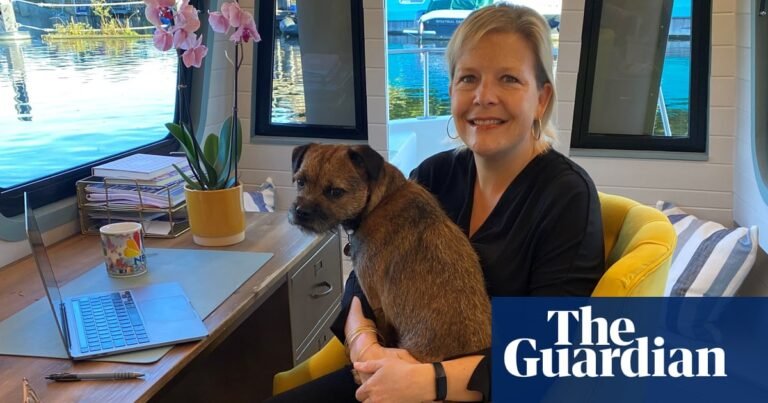If you’d told me when I was in my early 30s that, by the end of that decade, I would be living in a houseboat, I would never have believed you. I was a devoted Londoner, born and bred, and very wedded to my city lifestyle. I’d got a 100% mortgage and bought a tiny flat with a balcony, where I would host parties – and defy gravity – every weekend.
Romantically, I was jumping from one emotional disaster to another, falling for unsuitable people, closing my ears to those who dropped hints about biological clocks. I had my dream career in publishing and most weeknights could be found stumbling out of the Groucho Club and into a cab. In the early 00s, publishing was all about “networking” and there was always someone keen to go for “just one” – code for a late night of heavy drinking, often culminating in karaoke. I’d get out of bed at 9am the next day, get on the tube and be at my desk by 10, with my boss shaking his head knowingly at my “breakfast meeting” alibi. Then I’d do it all again.
I was a total ageing party girl cliche. My parents had given up on the idea of me settling down and, luckily, I had a younger sister who was getting married, which took the pressure off. I spent her wedding determined to be the last one on the dancefloor in my bright pink dress and feather boa, so that no one would guess I was as worried about my future as they all seemed to be.
And then I met James. We’d actually crossed paths some years earlier, but our mutual friends began to nudge us towards each other around 2008, after we each went through a breakup.
Something in me knew that I needed to tread carefully with him. James was super-smart and intuitive, didn’t like arguments and stood up to me when I behaved carelessly. He challenged me in a way I hadn’t encountered before.
He also had a rootedness about him, seeming settled and happy on Taggs Island in Hampton, south-west London, where he lived. I’d heard some time before that James lived on an island houseboat, a place where you woke to the swans and the geese, and the rowers, with an eccentric and wonderful community, like a floating village. At that stage, I hadn’t been interested in swans, or rowers, or community, but when he invited me to lunch at his home, I thought I’d better go and see what all the fuss was about, swallowing the expensive 40-minute cab ride to get there. That July day, everything sparkled on the river. We sat in the garden, surrounded by climbing roses, watching the boats going past, with friendly neighbours dropping in to say hello. We even swam in the river. By the end of the date, I didn’t want to go home.
Things became serious between us very quickly and we decided to try for a baby, but that didn’t mean I wanted to give up my flat or my work-hard-play-hard lifestyle. Even though I could be in Waterloo in 40 minutes, Taggs Island felt like a long way from city life – and I was looking at an hour and a half’s commute to work. When I became pregnant, I knew that living between our two homes was no longer feasible, but I found it hard to let go.
I finally moved to the houseboat the summer before our son was born, after James convinced me that it would be an amazing place to bring up children: the freedom, the river, going to school by boat, a huge park on our doorstep. James was already a devoted islander but I found the change hard at first. I wasn’t used to the lack of privacy, the island WhatsApp group that pinged all day long or the long commute as I got enormous and tired.
And then, something magical happened. On one of the first days of my maternity leave, I was feeling lost and out of place, miles away from the “real world”, when I received an invitation from a lovely neighbour, who also had a baby, asking me for tea. We had a lot in common: she was also an older mum, a writer, and had previously led a Soho life. That tea on her balcony led to us spending most of our maternity leave exploring local child-friendly cafes together, and forging friendships with other mothers on the island. Some of them had grown up there themselves and had wanted to return with their own kids.
It gave me a sense of the legacy and the unique appeal of this extraordinary place where I now live. After that, there was no stopping me: I leaned into island life, joining the local book club and even taking up kayaking. I began to discover what community means and how important it can be in supporting you when you feel like a fish out of water. I now have a floating office in a canal boat and enjoy working from there more than I ever did in the city – even if there are fewer opportunities for post-work drinks and late-night karaoke.


